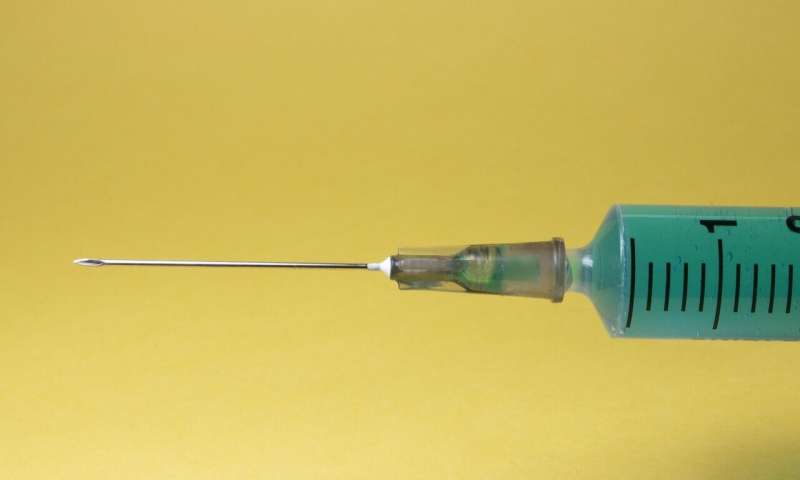This article has been reviewed according to Science X's editorial process and policies. Editors have highlighted the following attributes while ensuring the content's credibility:
fact-checked
trusted source
proofread
How people judge anti-vaxxers who die from COVID-19

When people who publicly reject COVID-19 vaccines later die from the disease, observers have complex reactions to their fates, a new study suggests.
While very few rejoice in the deaths of anti-vaxxers, some people believe those who are dogmatic against vaccines are deserving of worse outcomes—and that reaction is related to the political party affiliation and vaccination status of the person evaluating the anti-vaxxer.
Democrats and those who were vaccinated were more likely than Republicans and the unvaccinated to think anti-vaxxers who died got what they deserved—but even 63% of Democrats in the study thought an anti-vaxxer deserved to have a full recovery from the disease (compared to 80% of Republicans).
Only 4.6% of people in the study thought an anti-vaxxer who contracted COVID-19 deserved death.
The study involved participants reading mock social media posts from an anti-vaxxer and reacting to different scenarios about how this anti-vaccine advocate reacted as he or she got sick and later died.
"What we found indicates that people may view those on social media as characters in a morality play," said study co-author Matthew Grizzard, associate professor of communication at The Ohio State University.
"Our results show that people—particularly those who were vaccinated themselves—are likely to judge those who shared misinformation about the COVID vaccine as immoral and deserving of some level of retribution."
The study was published in the journal New Media & Society.
The study was inspired by the "Herman Cain Award" forum (called a subreddit) on the social media site reddit. Herman Cain was a Republican politician who contracted COVID-19 and died, and whose social media accounts continued to disseminate COVID-19 misinformation after his death. On the reddit forum, people share stories of anti-vaxxers and COVID deniers who died from the disease.
The Herman Cain Award site and others like it resulted in news coverage that categorized the sites as cruel and heartless.
But this study suggests a more nuanced interpretation of those who judged anti-vaxxers who got sick and died, said study co-author Rebecca Frazer, who recently earned her Ph.D. in communication at Ohio State.
"We have people who are judging anti-vaxxers and considering them deserving of some level of suffering, but on the other hand, there's very little positive emotion about watching them suffer," Frazer said.
"Those two things seem in tension, but they are both in our findings."
The researchers used a professional panel company to recruit an adult sample that was matched to the U.S. population on age, sex, race/ethnicity and region. The final sample included 932 people that was close to the U.S. population in political affiliation and vaccination status.
All participants were shown a series of mock Facebook status updates that mimicked the actual posts found in the Herman Cain Award subreddit. The status updates were from a person named Terry Adams, with the gender intentionally unspecified.
In the first post, Terry expressed uncertainty about the COVID-19 vaccine or was dogmatically opposed to the vaccine.
In this case, all participants—Republicans and Democrats included—liked Terry more when he or she was less dogmatic and only expressed uncertainty about the vaccine.
But in later posts, when Terry contracted COVID and became critically ill, differences appeared in how people reacted to Terry, depending on whether he or she regretted not getting the vaccine or doubled down on not taking it.
Democrats had less positive evaluations of Terry than Republicans. In addition, vaccinated participants regardless of their political party also had less positive evaluations when Terry doubled down on not getting the vaccine.
"Republicans were more okay with Terry continuing to question the vaccine and less positive than Democrats when Terry regretted not getting the vaccine," Grizzard said.
In the final Facebook post, Terry's brother announced that Terry had died of COVID. Participants in the study were asked how "satisfied" they were with Terry's death. Overall, participants were more satisfied with his or her death when Terry maintained anti-vaccination views right up to death.
Vaccinated participants were more satisfied with Terry's death than unvaccinated participants, and Democrats were more satisfied than Republicans.
But no group showed high levels of satisfaction, the results showed. Participants rated their satisfaction on a scale of 1 to 7, with 7 being the most satisfied. The average score was 2.93 for Democrats, compared to 2.51 for Republicans.
The researchers also asked participants to rate how happy they were with Terry's death—a question that aimed to get at the German concept of "schadenfreude," which has been defined as "feelings of pleasure that a person experiences in response to another person's failures or misfortunes."
Participants rated their happiness on a scale of 0 to 6, with six being the most happy. Results showed that even participants who thought Terry deserved death had an average happiness rating of only 1.6 on the scale, compared to 0.54 for those who thought Terry deserved to fully recover.
"We saw a moral judgment by those who thought Terry deserved some level of suffering or death, and they wanted justice to be served, or at least what they considered justice," Frazer said.
"But even they didn't express a lot of happiness at Terry's death."
Overall, the results suggest that most people don't take pleasure in anti-vaxxers dying, even if they believe they deserve it, Grizzard said.
"It is more a feeling that anti-vaxxers acted immorally and maybe put others at risk. And because of that, they deserve some level of suffering. But even those who are judging these anti-vaxxers most harshly are typically not rejoicing in their suffering or death," Grizzard said.
More information: Matthew Grizzard et al, Demystifying Schadenfreude: How disposition theorizing explains responses to social media stories of unvaccinated COVID-19 deaths, New Media & Society (2023). DOI: 10.1177/14614448231184868
Provided by The Ohio State University




















